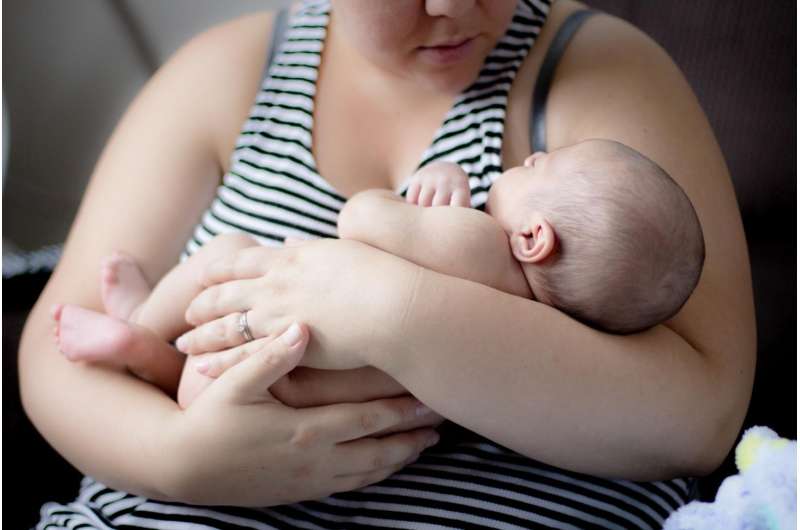This article has been reviewed according to Science X's editorial process and policies. Editors have highlighted the following attributes while ensuring the content's credibility:
fact-checked
reputable news agency
proofread
What you need to know about the new RSV shot for babies

Ahead of the winter respiratory virus season, many parents were relieved the U.S. Food and Drug Administration approved a shot to combat respiratory syncytial virus, or RSV, for infants and toddlers this summer.
But the shot is hard to come by.
RSV is a common respiratory virus that usually causes mild, cold-like symptoms in most adults who recover in a week or two, according to the Centers for Disease Control and Prevention. But that's not the case for infants and toddlers, who are at higher risk of the virus becoming severe or life-threatening.
The first vaccine for RSV was approved in May and was targeted for older adults.
Two months later, federal regulators approved the first long-lasting shot for infants younger than eight months who are entering their first RSV season. According to the CDC, Nirsevimab, which is made by AstraZeneca and sold under the brand name Beyfortus, reduces the risk of severe RSV by 80%. One dose lasts about five months, the length of the average RSV season.
The shot does not activate the immune system the way a vaccine would, but instead introduces antibodies to protect against RSV. Health officials with the CDC say once the antibodies are out of a baby's system, the immunity is also gone.
Amid the peak of RSV season, there has been unprecedented demand for the shot and not enough supplies to go around.
The CDC recently announced the release of more than 77,000 additional doses to be distributed immediately to physicians and hospitals through the Vaccines for Children Program. The CDC and FDA are working with drug manufacturers to ensure availability through early next year.
What preventive measures can parents can take?
Children at high risk include those six months and younger, infants born prematurely, those younger than two with congenital heart disease and those with weakened immune systems who have neuromuscular disorders, according to the American Lung Assn.
Previously, the only immunization against severe RSV for babies was a shot women could get during weeks 32 through 36 of pregnancy. That shot is still available and recommended September through January.
There also are everyday preventive measures to help reduce the spread of RSV and other respiratory illnesses, according to health agencies such as the CDC, American Lung Assn. and the California Department of Public Health:
- Stay home if you're feeling sick.
- If you need to leave your home, consider wearing a mask in crowded or indoor areas.
- Wash your hands with soap and water for at least 20 seconds.
- Avoid touching your face with unwashed hands.
- Cover your mouth and nose when you cough and sneeze.
- Avoid close contact with others, such as kissing, shaking hands and sharing cups and utensils.
- Clean frequently touched surfaces, including doorknobs and mobile devices.
What are the signs of RSV?
RSV affects both the upper respiratory system, which includes the nose and throat, and the lower respiratory system, which includes the lungs.
The virus is highly transmissible. You can catch it if the droplets from an infected person's cough or sneeze get in your eyes, nose or mouth; if you touch a surface (such as a doorknob) that has the virus on it and then touch your face before washing your hands; or if you have direct contact with the virus (for example, by kissing the face of a child with RSV). Being in crowded places with people who may be infected or having exposure to other children or siblings who may be infected are common ways to pick up the virus.
RSV can survive for many hours on hard surfaces such as tables and crib rails; it has a shorter life span on softer surfaces such as tissues and hands.
A person infected with RSV is usually contagious for three to eight days. However, some infants and people with weakened immune systems can continue to spread the virus for as long as four weeks, even after their symptoms go away, according to the CDC.
Virtually all children get an RSV infection by the time they are two, but the virus can cause complications, the CDC said.
Health agencies recommend parents reach out to their health care provider if their child is showing signs of infection.
According to health officials at Cedars-Sinai Medical Center, the most common symptoms are runny nose; fever; cough; short periods without breathing; trouble eating, drinking or swallowing; wheezing, flaring of nostrils or straining of the chest or stomach while breathing; breathing faster than usual or trouble breathing; and turning blue around the lips and fingers.
These symptoms can seem like other health conditions, so the hospital advises parents to have their child see a health care provider for a diagnosis.
2023 Los Angeles Times. Distributed by Tribune Content Agency, LLC.




















